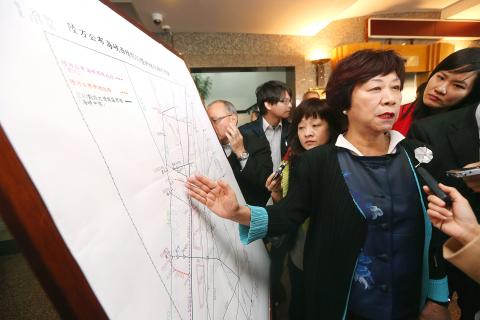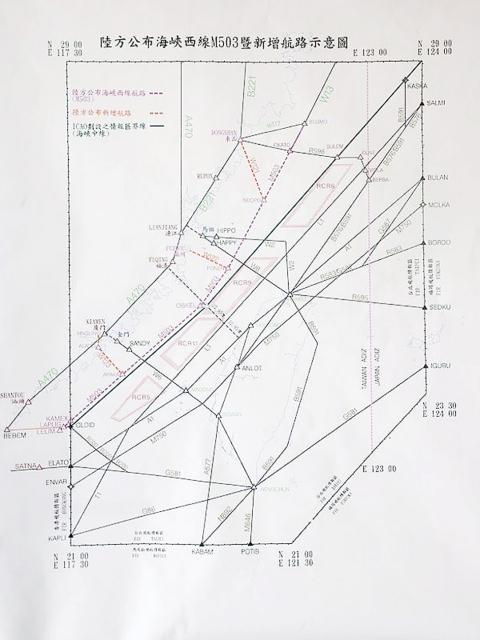A unilateral decision by China to establish new aviation routes near the midline of the Taiwan Strait without further negotiations with Taipei was “unacceptable,” the Civil Aeronautics Administration (CAA) said yesterday, adding that it would seek to communicate with the Chinese government on related safety issues in the months to come.
CAA Director-General Jean Shen (沈啟) said that Beijing announced an updated aviation safety bulletin on Monday morning which included four new air routes near China’s southeast coast. Among them, a route labeled M503 is nearly parallel to the middle line of the Taiwan Strait, coming as close to the line as 7.8km.
Additionally, three more routes — W121, W122 and W123 — were established as feeder routes for M503, she said.

Photo: CNA
“The air route W122 would affect Taiwanese air routes W8 and W2, which are used by Taiwanese flights to the outlying islands of Matsu,” Shen said. “The W123 route, on the other hand, is close to Taiwanese route W6, which is used by flights to Kinmen.”
Shen said that Beijing intended to use the M503 route to ease the load on its southeast coast route, which connects Shanghai, Fuzhou, Xiamen, Shenzhen, Zhuhai, Guanzhou and Hong Kong.
She said that both sides had had only “informal discussions” about creating such a route, including addressing the potential deviation of air routes due to inclement weather conditions, air traffic control issues and adjusted aircraft altitudes.

Photo courtesy of the Civil Aeronautics Administration
However, the two sides have not reached consensus on any one of these issues, she said.
The three feeder routes further surprised the administration, as Beijing had not mentioned anything about them previously, she said.
“Based on the spirit of the international civil aviation agreement, any member of the International Civil Aviation Organization should engage in negotiations in advance if any of its new air routes would affect the flight information regions [FIR] nearby,” Shen said. “We find China’s unilateral decision to establish these routes unacceptable. China should continue its communication with us, following the spirit of the international civil aviation agreement.”
Shen said China is scheduled to start using these routes at midnight on March 5, adding that it had indicated that the flights would operate along a buffer zone that is about 7.4km west of M503 when the route goes into service.
However, she said that M503 falls within the Shanghai FIR, which is very close to the Taipei FIR and has to accommodate many international flights.
In light of potential aviation safety concerns that the new route could engender, Shen said the CAA would communicate the technical issues to China.
CAA air traffic control department director Lee Jian-kuo (李建國) said that determining how far west of M503 the CAA would want the routes to move requires further talks with China, adding that the agency wants the buffer zone to be “as large as possible.”
Also, the Ministry of National Defense said that military air patrols would not be changed by China’s flight route plans, adding that patrols of Taiwan’s airspace will be increased, if necessary.
The military conducts airborne patrols throughout the nation’s airspace and these will not be affected by China’s route proposals, the ministry said in a statement.
Questioned about national security concerns, the ministry said that it will continue to monitor aircraft near the median line of the Taiwan Strait and increase air patrols if necessary.
In accordance with the principles of “No fear, no evasion and no showing of weakness,” the ministry said it would monitor, intercept or expel aircraft entering Taiwanese airspace without prior notification.

CHAOS: Iranians took to the streets playing celebratory music after reports of Khamenei’s death on Saturday, while mourners also gathered in Tehran yesterday Iranian Supreme Leader Ayatollah Ali Khamenei was killed in a major attack on Iran launched by Israel and the US, throwing the future of the Islamic republic into doubt and raising the risk of regional instability. Iranian state television and the state-run IRNA news agency announced the 86-year-old’s death early yesterday. US President Donald Trump said it gave Iranians their “greatest chance” to “take back” their country. The announcements came after a joint US and Israeli aerial bombardment that targeted Iranian military and governmental sites. Trump said the “heavy and pinpoint bombing” would continue through the week or as long

TRUST: The KMT said it respected the US’ timing and considerations, and hoped it would continue to honor its commitments to helping Taiwan bolster its defenses and deterrence US President Donald Trump is delaying a multibillion-dollar arms sale to Taiwan to ensure his visit to Beijing is successful, a New York Times report said. The weapons sales package has stalled in the US Department of State, the report said, citing US officials it did not identify. The White House has told agencies not to push forward ahead of Trump’s meeting with Chinese President Xi Jinping (習近平), it said. The two last month held a phone call to discuss trade and geopolitical flashpoints ahead of the summit. Xi raised the Taiwan issue and urged the US to handle arms sales to

State-run CPC Corp, Taiwan (CPC, 台灣中油) yesterday said that it had confirmed on Saturday night with its liquefied natural gas (LNG) and crude oil suppliers that shipments are proceeding as scheduled and that domestic supplies remain unaffected. The CPC yesterday announced the gasoline and diesel prices will rise by NT$0.2 and NT$0.4 per liter, respectively, starting Monday, citing Middle East tensions and blizzards in the eastern United States. CPC also iterated it has been reducing the proportion of crude oil imports from the Middle East and diversifying its supply sources in the past few years in response to geopolitical risks, expanding

Pro-democracy media tycoon Jimmy Lai’s (黎智英) fraud conviction and prison sentence were yesterday overturned by a Hong Kong court, in a surprise legal decision that comes soon after Lai was jailed for 20 years on a separate national security charge. Judges Jeremy Poon (潘兆初), Anthea Pang (彭寶琴) and Derek Pang (彭偉昌) said in the judgement that they allowed the appeal from Lai, and another defendant in the case, to proceed, as a lower court judge had “erred.” “The Court of Appeal gave them leave to appeal against their conviction, allowed their appeals, quashed the convictions and set aside the sentences,” the judges